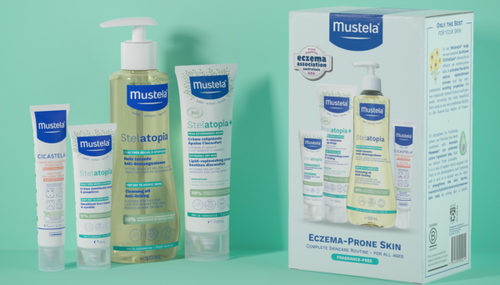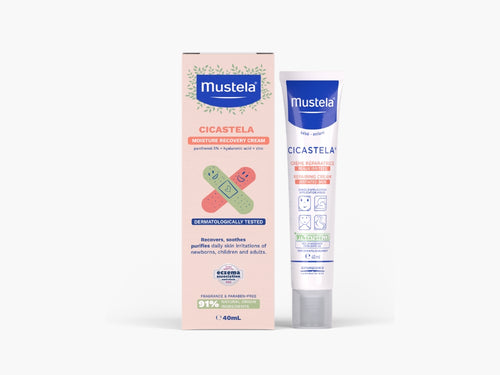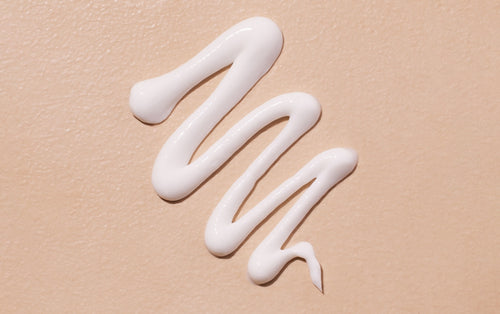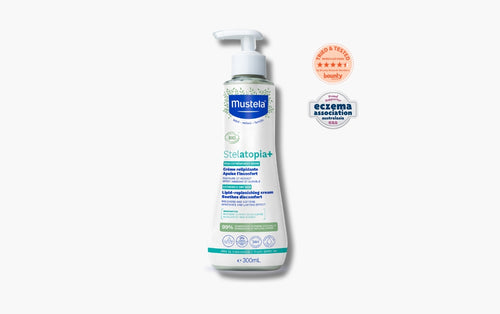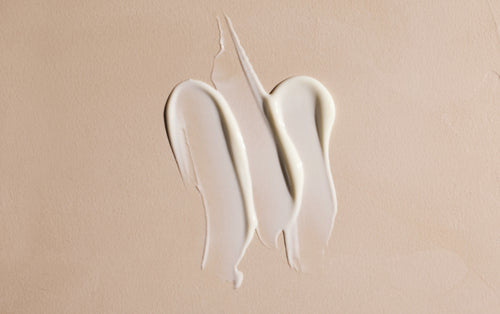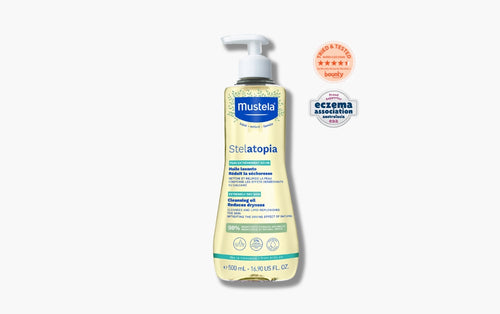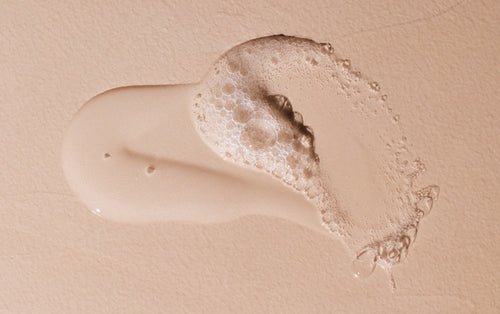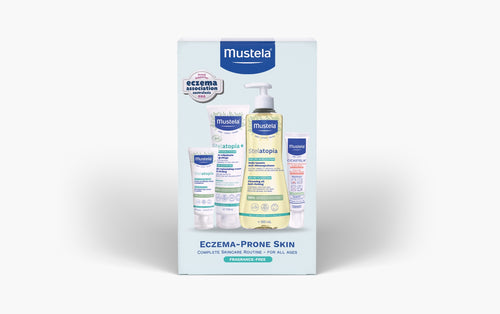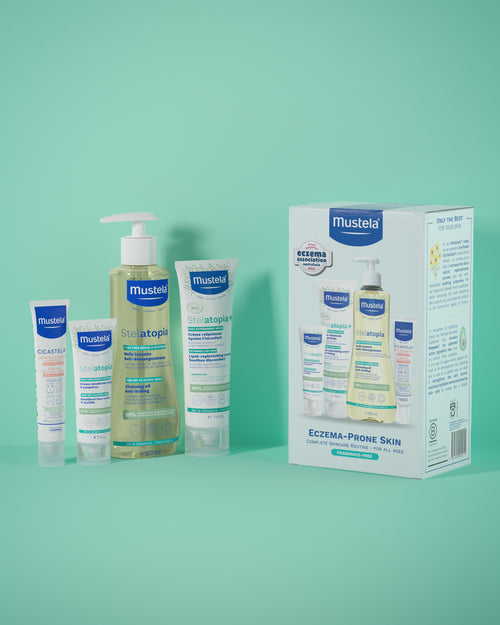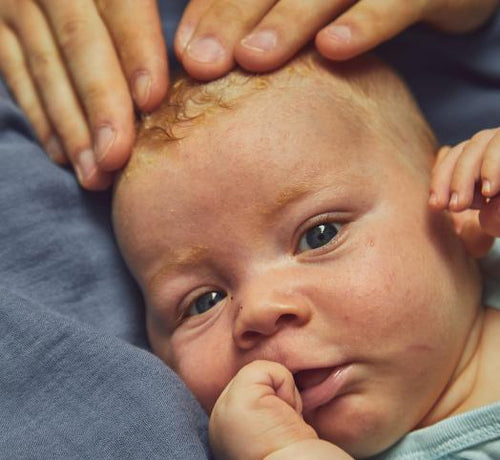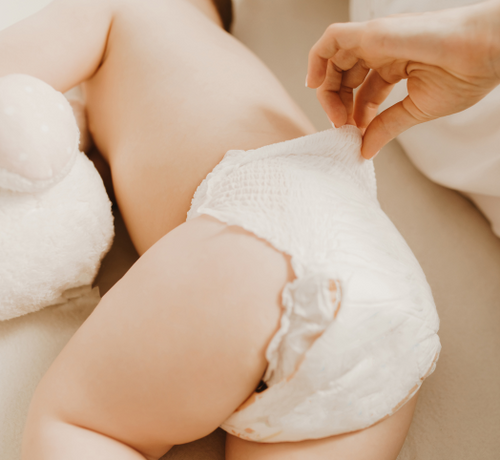Red, itchy patches on baby's skin? Is the baby having a hard time falling asleep? These may be signs of eczema-prone skin. This skin condition CAN be improved, though, if you learn to spot its symptoms, avoid specific situations and use appropriate skin care products
Signs of atopic dermatitis
"Atopic dermatitis", also called "eczema", is a skin barrier disorder that affects 1 in 3 children. It appears as dehydrated skin on the body and face and alternates between eczema flare-ups with red patches and periods of relief. Eczema can occur from the age of two months. It decreases in severity over time and often disappears spontaneously, usually around the age of five or six. Meanwhile, eczema will disrupt your baby's day-to-day life because it frequently translates to itching and discomfort.
A hereditary condition
Eczema runs in families. If one or both parents have it, it increases your baby's chances of developing it.
Heredity plays an important part. This precious information will help you to adopt specific skin care routines from birth that can help reduce by 33% to 50% the risks of your baby developing symptoms of eczema-prone skin2.
The first signs of eczema
An interview with Dr. Clarence De BELILOVSKY, Dermatologist: How to recognise eczema-prone skin.
.A series of symptoms can help you identify eczema-prone skin:
- Your child's skin is dry and rough, even when regularly moisturised. It can even start peeling in some areas.
- Red patches appear on the baby's chin, cheeks, arms and belly…If tiny bumpsalso show, this is a sign ofa flare.
- The itch causes your baby to scratch the irritated skin areas.
- Your baby finds it hard to fall asleep. Of course, this may be caused by other reasons, but it remains a significant sign.
Eczema Flare-ups
What exactly happens during a flare?
Eczema flares always occur like this: it starts with small, red, itchy spots on the baby's skin. The inflammation causes these spots to become rough and dry. Tiny blisters can also appear, and a transparent liquid may ooze out. They give way to a crust that will disappear with adequate care.
But don't worry: no matter how intense the breakouts, they won't leave any scars on the baby's skin.
How to prevent eczema-prone skin
You can prevent eczema-prone skin by avoiding certain situations that trigger eczema and using appropriate skin care daily.
Avoid these situations daily:
- Contact with allergens such as dust or mites
- Drying or irritating factors such as soap, specific clothing materials, high temperatures or dry air…
Find our advice on how to take care of eczema-prone skin daily.
Eczema, the proper routine
Appropriate care from birthcan reduce the risk of developing the symptoms of eczema-prone skin by 33% to 50% (source: Eric L. Simpson 2014, Horimukai 2014).
However, if your child does develop this skin condition, specialists recommend that you help rebuild your baby's skin to postpone or reduce flares. Simple and very effective routines will help to prevent these critical periods:
- Emollient products
- You can use emollientstwice daily to help protect your baby's skin like our Stelatopia+ Lipid Repleneshing Cream If you're off for a stroll or a weekend, a face cream will complement this emollient routine.
- Soothing bathing
- Specialists recommend using a mild, soap-free, fragrance-free, nourishing baby wash: gel or oil, it's up to you! And for the baby's scalp, pick a suitable, mild shampoo. An easy rinseable foam shampoo will do the job perfectly.
- A good night's sleep
- Remember to use 100% cotton pyjamas!
Eczema-prone skin, redness, allergies, etc.: ask for medical advice
If your baby may have eczema, it's always better to ask for medical advice.
Read our complete guide to understand and manage your baby's eczema.


